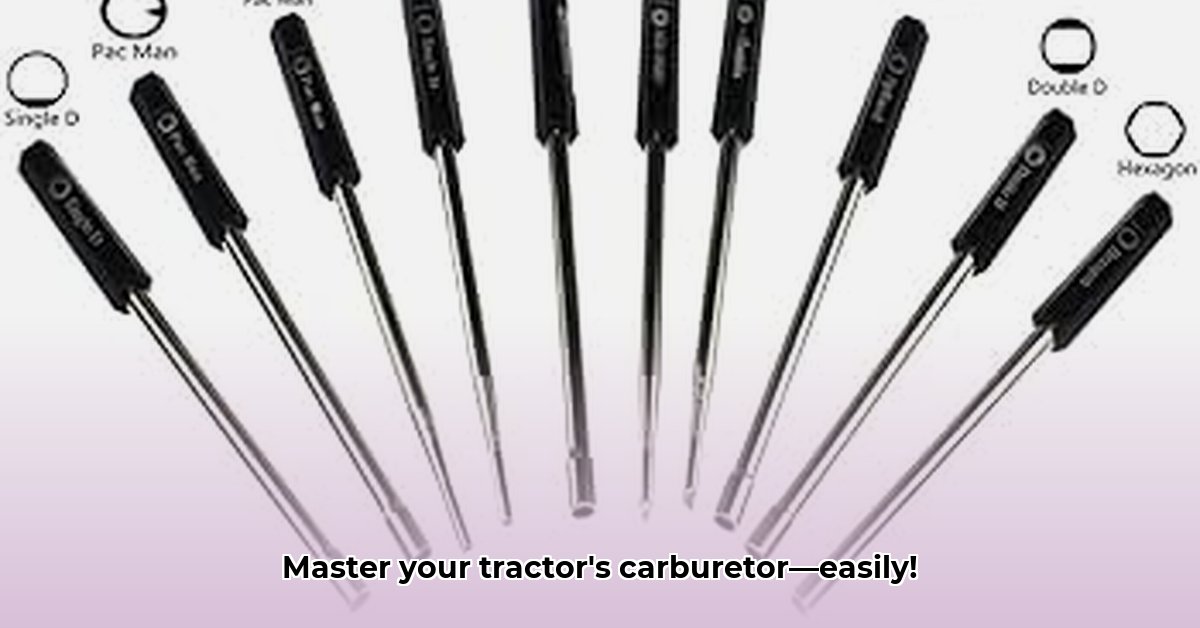
Understanding Carburetor Adjustment and Its Impact on Sustainable Farming
A properly tuned carburetor is the cornerstone of efficient and sustainable farming. It ensures your engine runs smoothly, maximizing fuel efficiency, minimizing harmful emissions, and extending the lifespan of your valuable equipment. This translates to direct cost savings, reduced environmental impact, and a more responsible farming practice. This guide, utilizing a carburetor adjustment tool from Tractor Supply (or a comparable tool), will walk you through the process, empowering you to contribute to a greener future for agriculture.
Getting Started: Essential Tools and Safety Precautions
Before beginning any carburetor adjustment, gather your necessary tools. These include a carburetor adjustment tool (available at Tractor Supply or similar retailers), screwdrivers appropriate for your engine model, and importantly, your engine's owner's manual. Always consult your owner’s manual for specific instructions and diagrams relating to your equipment.
Safety is paramount: Always disconnect the spark plug wire before commencing any work on the carburetor. This crucial step prevents accidental engine starting and potential injury. Wear appropriate safety glasses and gloves.
Step-by-Step Carburetor Adjustment Guide
This guide utilizes a typical carburetor adjustment tool, common in agriculture settings. Individual carburetor designs may have minor variations, so always refer to your engine's manual for precise screw locations and details.
- Preparation: Disconnect the spark plug wire. Clean the carburetor area of any loose debris using compressed air or a brush.
- Locate Adjustment Screws: Your owner's manual will pinpoint the idle speed screw and the mixture screw. These screws control the engine's idle speed and the fuel-air mixture ratio, respectively. Note their initial positions – this is your baseline.
- Adjusting Idle Speed: Gradually turn the idle speed screw. Small adjustments will significantly impact the engine's idle speed. Aim for a smooth, consistent idle that's neither too fast nor too slow.
- Adjusting Fuel-Air Mixture: The mixture screw controls the fuel-to-air ratio. Make tiny adjustments, observing the engine's response carefully. A rich mixture (too much fuel) wastes gas and increases emissions while a lean mixture (too little fuel) can severely damage your engine. Small, incremental tweaks are key. Listen for a smooth, consistent engine sound and optimal performance.
- Testing and Fine-Tuning: After each adjustment set, reconnect the spark plug wire, start the engine, and observe its performance. Did the adjustment improve efficiency? Repeat steps 3 & 4 until you find the optimal settings for smooth operation and efficient fuel usage.
- Recording Settings: Once satisfied, carefully record the final positions of the idle speed and mixture screws. This serves as a valuable reference for future adjustments.
The Broader Impact: Sustainable Equipment Maintenance
Proper carburetor adjustment is not just about immediate engine performance; it’s a crucial element of sustainable agriculture. Extending the lifespan of your equipment reduces the need for replacement, minimizing the environmental impact of manufacturing and disposal. By extending the operational life, you also reduce overall fuel consumption leading to long-term cost savings and environmental benefits. This proactive approach to maintenance is a key component of sustainable farming practices.
Did you know that a properly tuned carburetor can improve fuel efficiency by up to 15%? This translates to substantial savings over the life of your equipment.
Responsible Disposal and Recycling
When your equipment eventually reaches the end of its useful life, responsible disposal is crucial. Explore options for recycling scrap metal, which recovers valuable resources. Specialized services can handle hazardous materials, ensuring environmental protection. Proper disposal reduces landfill waste and contributes to a circular economy.
Preventative Maintenance: A Sustainable Strategy
Regular preventative maintenance is an investment in the long-term sustainability of your farm. A scheduled maintenance plan, including periodic carburetor adjustments, prevents larger, more costly repairs. This approach significantly reduces the overall environmental impact and maintains the profitability of your farm.
By actively participating in responsible maintenance and disposal, you contribute to a more sustainable and environmentally conscious farming practice. The small effort of a carburetor adjustment can have a significant and lasting impact.